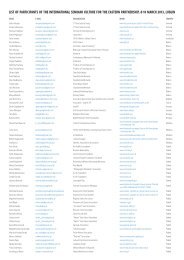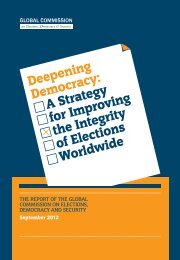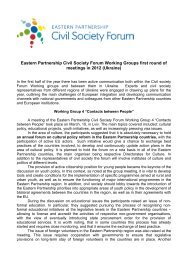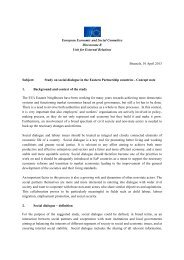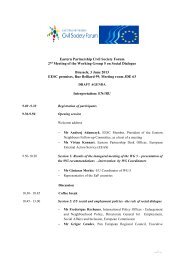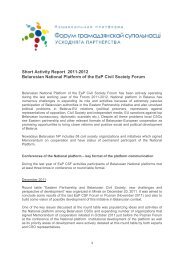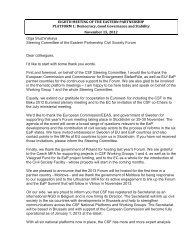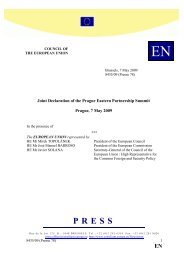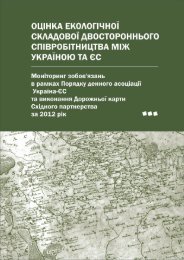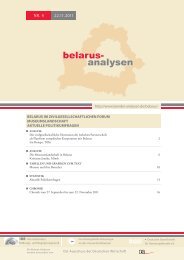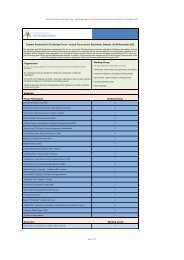Non-formal education - Eastern Partnership Civil Society Forum
Non-formal education - Eastern Partnership Civil Society Forum
Non-formal education - Eastern Partnership Civil Society Forum
Create successful ePaper yourself
Turn your PDF publications into a flip-book with our unique Google optimized e-Paper software.
In their programs civil society organizations focus on personal development, social and civic<br />
competences, and satisfaction of other <strong>education</strong>al needs related to human rapidly changing<br />
environmental reality. Since the needs of adults in Belarus in acquiring new knowledge and upgrading<br />
of acquired go far beyond the existing state system of vocational <strong>education</strong> and training, non-profit<br />
organizations and institutions are flexible enough to try and flexibly respond to the ever increasing<br />
demand.<br />
Despite their small number, they set fashion for new forms of organization of <strong>education</strong>al programs<br />
and are in the forefront of many processes not only in the field of adult <strong>education</strong>, but <strong>education</strong> in<br />
general. <strong>Non</strong>-<strong>formal</strong> <strong>education</strong> in a sector of non-governmental organizations is above all a sphere of<br />
exploration, innovation, experimentation, trial and error. Methods, form and content are implemented<br />
in non-<strong>formal</strong> <strong>education</strong> if for various reasons theycannot be realized in the <strong>formal</strong> <strong>education</strong> system.<br />
They can go there though field of testing and adaptation to be tested for strength and survival. All the<br />
best and viable then can enrich <strong>formal</strong> <strong>education</strong>.<br />
1. It’s very important that the <strong>education</strong>al programs of non-profit non-governmental organizations<br />
focus more on results than on process. Participation in them is based solely on the principle of<br />
voluntariness, if expectations of motivation are not met and training is not beneficial, then they can<br />
simply vote “with their feet.”<br />
2. In the non-<strong>formal</strong> <strong>education</strong>, as a rule, there is no such thing as a school year. Duration of<br />
training in the non-<strong>formal</strong> sector can last from one hour (for example, a separate chapter), a few days<br />
(training) to several years (long course). And experience shows that short-term training courses are<br />
dominated in non-<strong>formal</strong> <strong>education</strong> in Belarus. One person in a year can attend a variety of <strong>education</strong>al<br />
activities of one or more organizations. In the non-<strong>formal</strong> area there is also a huge number of training<br />
programs, which have nothing in common with each other 20 .<br />
3. In the “third sector” innovative <strong>education</strong>al practice approaches, directions and active learning<br />
(interactive, role-playing and simulation, case-study, simulation, etc.), different types of <strong>education</strong>al<br />
technologies (open space, workshop of future, World Café, peer <strong>education</strong>, study circles for adults,<br />
etc.)are very widely used<br />
Actively developing <strong>education</strong> for socially vulnerable categories of citizens is an area of adult <strong>education</strong>,<br />
which directly helps to relieve tension and develop the country’s stability. With no exaggeration we can say<br />
that adult <strong>education</strong> is an effective instrument of social adaptation and re-integration in society.<br />
A special place belongs to <strong>education</strong> for older people: not only new <strong>education</strong>al programs for older<br />
people to help them feel more comfortable in the new information environment, but also innovative<br />
forms of learning that involve active and responsible inclusion of older people into <strong>education</strong>al process<br />
as a sort of co-authors trainingare gradually starting to be introduced.<br />
Leaders in this area of non-<strong>formal</strong> adult <strong>education</strong> in Belarus are representatives from both capital<br />
and regions, especially you can select the project “Golden Age University” realizedby NGO Center<br />
for Information Support of Civic Initiatives“the Third Sector” in Grodno, and activities for the practical<br />
implementation of the concept “Institute of the Third Age” in Brest by Brest city public association of<br />
psychologists and the public association “Logos.”<br />
In the expansion of access of older people to <strong>education</strong>al services in Minsk and Minsk region, as<br />
well as in Brest and Brest region makes an important contribution to the project «TOLLAS – Towards<br />
Active society at any age”, implemented by dvv international representation through registered society<br />
«Deutscher Volkshochschul-Verband eV» (Germany) in the Republic of Belarus, the International NGO<br />
“Education Without Borders” and the whole pool of “associate partners” – the involvement of non-state<br />
and state organizations. Also an active player in this field is the International NGO “Understanding,”<br />
supported by German Federal Foundation “Remembrance, Responsibility and Future”, perform a longterm<br />
program “The venue – the dialogue,” in which a lot of attention is given to <strong>education</strong> of elder<br />
people. The main objectives of these projects are to provide an opportunity for older people to play<br />
20<br />
Жураковский В. Стандарты оценки деятельности организаций неформального образования //«Теория и<br />
практика некоммерческих организаций и местных сообществ». Бюллетень МПОО «АКТ». Выпуск от 07.11.2006.<br />
39



